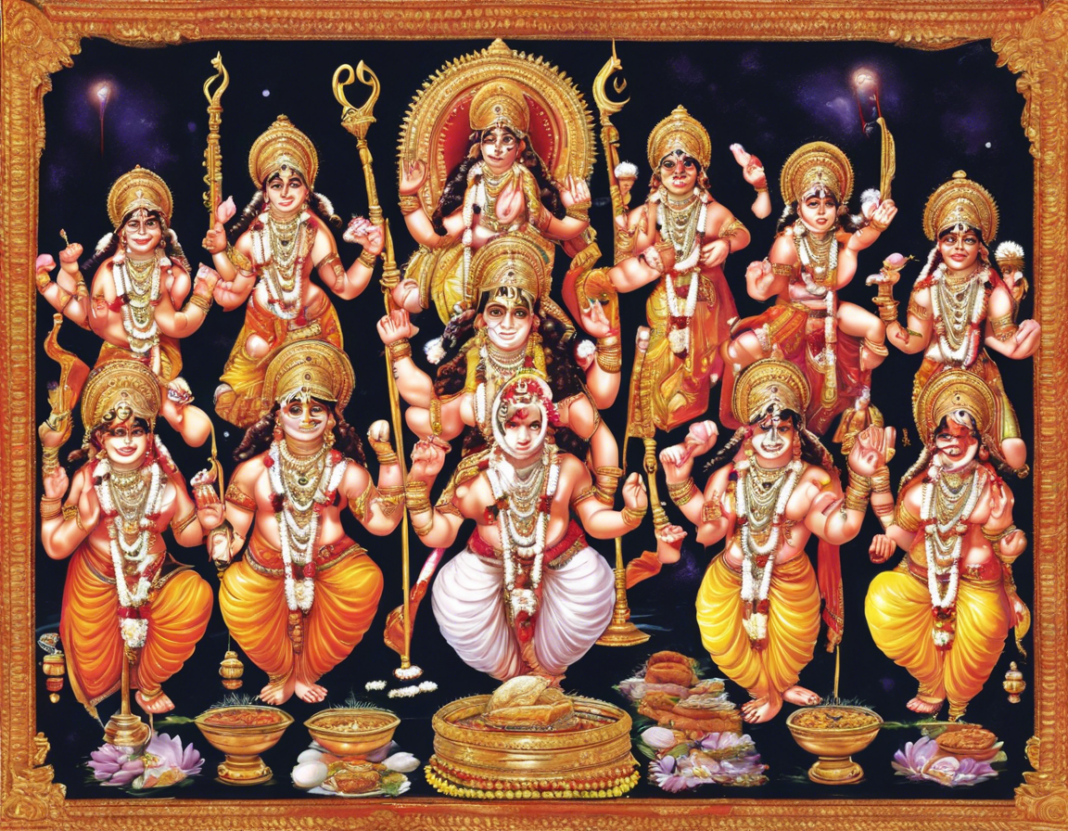Introduction
Bhakti or devotion plays a central role in many spiritual traditions around the world. In the Hindu faith, Bhakti is expressed through various practices, one of which is the chanting of mantras. Mantras are sacred sounds, words, or phrases that hold spiritual significance and power. One form of mantra practice in Hinduism is the chanting of Bhakt Namavalis, also known as “devotional name chants“.
What is Bhakt Namavali?
In the Hindu tradition, Bhakt Namavali refers to the recitation of a series of names of deities or divine beings. These names are often recited in a specific order and rhythm, and the practice is believed to invoke the presence and blessings of the deity being named. Bhakt Namavalis are commonly used in Puja (worship) rituals, meditation, and devotional gatherings.
Benefits of Chanting Bhakt Namavalis
-
Deepens Devotional Connection: Chanting Bhakt Namavalis allows devotees to deepen their connection with the divine being being invoked. The repetition of the deity’s name creates a sense of intimacy and closeness.
-
Purifies the Mind: Chanting mantras is believed to have a purifying effect on the mind. It helps to calm the mental chatter and bring a sense of peace and serenity.
-
Promotes Concentration: The rhythmic repetition of Bhakt Namavalis helps to focus the mind and improve concentration. This can be especially beneficial during meditation practices.
Popular Bhakt Namavalis
There are numerous Bhakt Namavalis dedicated to different deities in the Hindu pantheon. Some of the most popular ones include:
-
Vishnu Sahasranama: A chant that recites the 1000 names of Lord Vishnu, extolling his various attributes and virtues.
-
Lalitha Sahasranama: A sacred text that lists the 1000 names of the goddess Lalitha Tripurasundari, highlighting her qualities and powers.
-
Hanuman Chalisa: A devotional hymn dedicated to Lord Hanuman, praising his bravery, loyalty, and devotion to Lord Rama.
-
Sai Baba Ashtothram: A chant listing the 108 names of Sai Baba of Shirdi, a revered saint in the Indian tradition.
How to Practice Bhakt Namavalis
-
Set an Intention: Before chanting, it is helpful to set an intention for your practice. Whether it is seeking protection, guidance, or peace, clarifying your intention can enhance the efficacy of the chanting.
-
Create a Sacred Space: Find a quiet and clean space for your practice. You can decorate it with flowers, candles, or symbols of the deity you are invoking.
-
Begin with Pranayama: Engaging in some deep breathing exercises or pranayama can help calm the mind and prepare it for chanting.
-
Chant with Devotion: As you recite the names of the deity, try to do so with deep reverence and devotion. Let each repetition fill you with love and gratitude towards the divine.
-
End with Gratitude: Conclude your chanting practice by expressing gratitude to the deity for their blessings and protection.
Frequently Asked Questions (FAQs)
-
Should I chant Bhakt Namavalis silently or aloud?
-
You can chant Bhakt Namavalis either silently or aloud, depending on your preference. What matters most is the intent and devotion with which you chant.
-
How long should I chant Bhakt Namavalis for?
-
There is no fixed duration for chanting Bhakt Namavalis. You can start with a few minutes a day and gradually increase the duration based on your comfort and availability.
-
Can I chant Bhakt Namavalis in any language?
-
Yes, you can chant Bhakt Namavalis in any language that you are comfortable with. The most important aspect is the devotion and sincerity with which you chant.
-
Can non-Hindus chant Bhakt Namavalis?
-
Bhakt Namavalis are open to anyone who wishes to chant them, regardless of their religious background. The power of the mantras transcends cultural and religious boundaries.
-
Is it necessary to have prior experience in chanting mantras to practice Bhakt Namavalis?
-
No, prior experience is not required to practice Bhakt Namavalis. Anyone can start chanting these devotional name chants with an open heart and mind.
-
Can I chant multiple Bhakt Namavalis in one session?
-
Yes, you can chant multiple Bhakt Namavalis in one session if you feel drawn to do so. Just ensure that you maintain integrity and devotion in your practice.
-
Are there specific times of the day when it is more auspicious to chant Bhakt Namavalis?
-
While there are auspicious times for chanting, such as early morning and evening, you can chant Bhakt Namavalis at a time that suits your schedule and lifestyle.
-
Can chanting Bhakt Namavalis bring about tangible benefits in one’s life?
-
The benefits of chanting Bhakt Namavalis can be spiritual, emotional, and even mental in nature. Many practitioners report experiencing peace, clarity, and blessings in their lives.
-
What role does faith play in practicing Bhakt Namavalis?
-
Faith forms the foundation of Bhakti practices like chanting mantras. Believing in the power of the divine names you chant can deepen your connection with the divine.
-
Can Bhakt Namavalis be chanted for specific intentions or desires?
-
Yes, you can chant Bhakt Namavalis with specific intentions or desires in mind. The devotional energy you generate through chanting can help manifest your heartfelt wishes.
Conclusion
Bhakt Namavalis offer a profound way to cultivate devotion and connect with the divine through sacred names. Whether you are seeking spiritual growth, inner peace, or divine blessings, the practice of chanting devotional name mantras can be a powerful and transformative tool on your spiritual journey. By immersing yourself in the vibrations of these sacred sounds, you can awaken a deeper sense of love, gratitude, and connection with the divine beings that inspire you.












